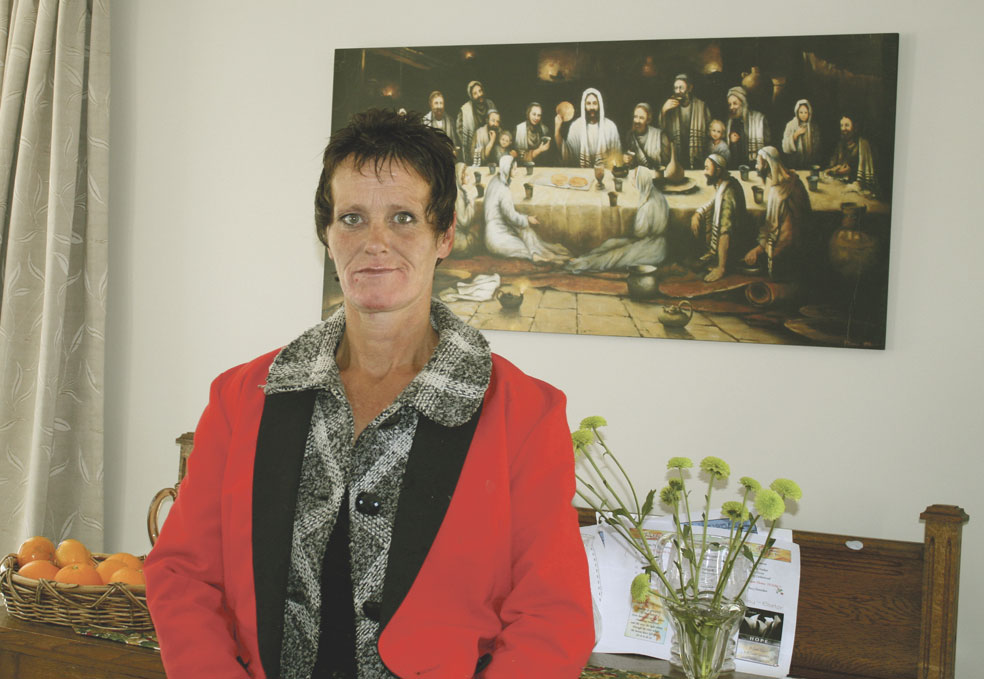Feature
Cecily McNeill
5 April, 2013
 A long-term homeless woman Rebecca Voice of Upper Hutt whose story inspired the search for a homeless women’s facility in Wellington, says the churches have saved her life.
A long-term homeless woman Rebecca Voice of Upper Hutt whose story inspired the search for a homeless women’s facility in Wellington, says the churches have saved her life.
Rebecca’s sleeping rough behind St Anne’s Church in Newtown regularly in 2008 prompted the parish to explore the implications of homelessness and an appropriate gospel-based response. Lay pastoral leader Karen Holland would often give Rebecca cups of tea or a meal before ensuring that she was gone when the children arrived at nearby St Anne’s School (because of the school’s legal requirement to keep the children safe).
The parish held a number of meetings to learn about homelessness, inviting Downtown Community Ministry director Stephanie Macintyre and the manager of the night shelter Mike Leon to address them.
The parish was particularly concerned about the safety of school children who used the area around the church as a playground.
The experience inspired a group of women to search for a suitable facility to house homeless women short term.
Rebecca, 48, has been homeless for most of her life, running away from an alcoholic, abusive father when she was four and then living with aunts and other family members from the age of seven. She was ‘locked in a shed [for a period] with a dog and a can of petrol’ which, she says, started her substance abuse.
She remembers a great deal of sexual abuse from her father with ‘a lot of beatings, physical, mental and violent abuse from both parents’. She was often locked up without food or her nappies being changed.
At 14 she was back on the streets and, at 16, gave birth to a son who is now 30.
Three other children were born, another boy now 25 and two girls 16 who, her mother says proudly, is training to be a youth worker and a 13-year-old who wants to work with children.
Rebecca says all were born in jail and her parents raised them because their fathers were all violent (her mother remarried some time after her father had died).
‘My past horrific, trauma-filled life had me becoming anti-the-system and I ended up spending [some years] in jail.’ Rebecca has since forgiven her parents and is now in constant contact with her mother.
After a year in rehabilitation, recovering from ‘paint, solvents, abuse, trauma’, Rebecca was able to ‘turn her life around’ and would often go to the court to try to help others, many of them children of gang members who would go to church with her.
However, Rebecca freely admits she has slipped back into the glue-sniffing to help her cope with a life which is based on the streets where she ‘feels safe’.
The Salvation Army has helped her in a number of ways particularly with food parcels. She often goes to Our Lady of Grace in Heretaunga where Fr David Dowling talks with her and allows her to play the piano.
‘God’s people in churches have saved my life because they have the same belief I have – peace, love and harmony.’
Rebecca’s instinct for survival has given her a resilience to deal with what life serves up, much of it mediocre in human terms. She is negative about ‘the system’ and the mention of Victim Support draws a sneer. She is well known as difficult among those who walk alongside homeless people and try to advocate for a better deal for them.
One can barely imagine what ‘the system’ must look like from the perspective of someone who dosses in another’s cast-off council house with no toilet seat and the top five or so centimetres missing from the wash basin.
For a woman who would be house-proud in another life, the ill-fitting front door that has been bashed in too often to keep out life’s chills must be annoying. How can we continue to care for the Rebeccas of this world – the least of our brethren?